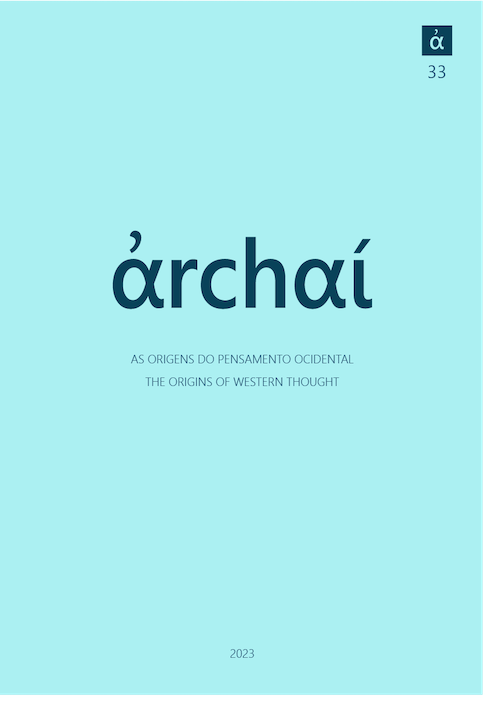Demonstration and Necessity: A short note on Metaphysics 1015b6-9
DOI:
https://doi.org/10.14195/1984-249X_33_20Palavras-chave:
Aristotle, explanation, demonstration, necessityResumo
I discuss a short string of five sentences in Metaphysics V.5, 1015b6-9 relating demonstration to necessity. My proposal is that Aristotle focuses his attention on the demonstration as a demonstration. Other interpretations reduce the necessity in question to the modality of the component sentences of the demonstrations (the conclusion and the premises). My view does not deny that modality of the component sentences is important, but takes seriously the idea that a demonstration itself should be understood as necessary-as not capable of being otherwise. A demonstration cannot be different from what it is in the sense that [i] its components cannot be different from what they are, [ii] its components must be related to each other exactly in the way they are related. Demonstrations aim at the fully appropriate explanation of a given explanandum-and each demonstration is individuated by the explanandum it takes. Thus, the basic idea is that, for the target explanandum that individuates a given demonstration, the premises delivering the fully appropriate explanation cannot be replaces with different ones. I show how this proposal, which explains Aristotle’s language in 1015b6-9 accurately, does not make demonstrations ‘melt down into conditional necessity’, first, because the modality of the component sentences is still importantly involved, second, because the explanatory relation expressed in a demonstration is a necessary fact in the real world, so that the demonstration itself is also necessary (in the way I have explained) inasmuch as it captures that fact.
Downloads
Referências
ANGIONI, L. (2016) Aristotle’s Definition of Scientific Knowledge (APo 71b 9-12). Logical Analysis and History of Philosophy 19, p. 140-166.
ANGIONI, L. (2018). Causality and Coextensiveness in Aristotle’s Prior Analytics I.13. Oxford Studies in Ancient Philosophy 54, p. 159-185.
ANGIONI, L. (2019). Aristotle’s Contrast between episteme and doxa in its context (Posterior Analytics I.33). Manuscrito 42, n. 4, p. 157-210.
ANGIONI, L. (2020). Aristóteles e a necessidade do conhecimento científico. Discurso 50, n. 2, p. 193-238.
BARNES, J. (1993). Aristotle: Posterior Analytics, Oxford, Clarendon Press.
BERTI, E. (2014). Aristote: Métaphysique Delta Paris, Librairie Philosophique J. Vrin.
BRONSTEIN, D. (2016). Aristotle on Knowledge and Learning Oxford, Oxford University Press.
DELCOMMINETTE, S. (2018). Aristote et la nécessité. Paris, Librairie Philosophique J. Vrin
FEREJOHN, M. (2013). Formal Causes Oxford, Oxford University Press .
FERREIRA, M. (2020). Συλλογισμός tem dois significados nos Analíticos?. Dissertatio 52, p. 59-89.
KIRWAN, C. (1993). Aristotle: Metaphysics Books III, V and VI, 2nd ed., Oxford, Clarendon Press .
MALINK, M. (2013). Aristotle’s Modal Syllogistic Harvard, Harvard University Press.
MENDELSOHN, J. (2019). Aristotle on the Necessity of What We Know PhD Dissertation, University of Chicago.
MIGNUCCI, M. (2007). Aristotele: Analitici Secondi Roma-Bari, Laterza.
MORAVCSIK, J. (1991). What Makes Reality Intelligible? Reflections on Aristotle’s Theory of Aitia In: JUDSON, L. (ed.). Aristotle’s Physics Oxford, Clarendon Press , p. 31-47.
REEVE, C. D. C. (2016). Aristotle: Metaphysics Indianapolis, Hackett Publishing.
ROSS, D. W. (1924). Aristotle’s Metaphysics Oxford, Clarendon Press .
ROSS, D. W. (1949). Aristotle’s Prior and Posterior Analytics, Oxford, Clarendon Press .
ROSS, D. W. (1984). Aristotle: Metaphysics In: BARNES, J. (ed.) Complete Works (Aristotle). Princeton, Princeton University Press (The Revised Oxford Translation).
Downloads
Publicado
Como Citar
Edição
Seção
Licença
Copyright (c) 2023 Lucas Angioni

Este trabalho está licenciado sob uma licença Creative Commons Attribution 4.0 International License.
Dado o acesso público desta revista, os textos são de uso gratuito, com obrigatoriedade de reconhecimento da autoria original e da publicação inicial nesta revista. O conteúdo das publicações é de total e exclusiva responsabilidade dos autores.
1. Os autores autorizam a publicação do artigo na revista.
2. Os autores garantem que a contribuição é original, responsabilizando-se inteiramente por seu conteúdo em caso de eventual impugnação por parte de terceiros.
3. Os autores garantem que a contribuição que não está em processo de avaliação em outras revistas.
4. Os autores mantêm os direitos autorais e concedem à revista o direito de primeira publicação, sendo o trabalho licenciado sob a Creative Commons Attribution License-BY.
5. Os autores têm permissão e são estimulados a publicar e distribuir seu trabalho on-line após a publicação na revista.
6. Os autores dos trabalhos aprovados autorizam a revista a, após a publicação, ceder seu conteúdo para reprodução em indexadores de conteúdo, bibliotecas virtuais e similares.
7. É reservado aos editores o direito de proceder ajustes textuais e de adequação do artigo às normas da publicação.



